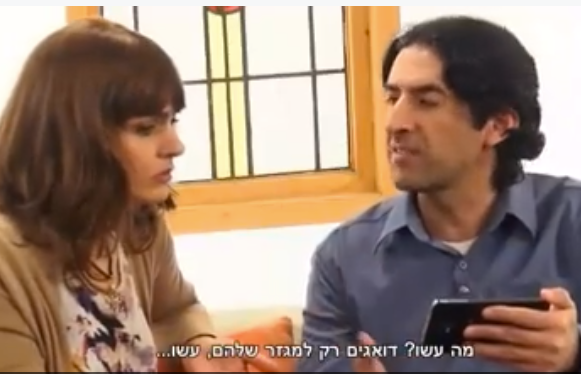The divide between the rationalist and anti-rationalist approaches to theology has fascinating ramifications with regard to the electoral system.
The Maimonidean rationalist approach is very straightforward. Our choices as to whom we vote for determines who will be in the government, which in turn determines policies and their consequences.
The anti-rationalist approach is very different. As we have discussed before (with regard to
whether soldiers are actually doing anything), the anti-rationalist approach popularly found in charedi circles today, based on Rav Dessler's school of thought, views our actions as being of no real significance in terms of direct consequences. Instead, they are simply a charade that we must go through in order for God
to operate. (And to the extent that we recognize God as being the One
actually doing things, we can minimize this charade). According to this
approach,
hishtadlus doesn't actually have anything to do with
parnassah and soldiers don't actually have anything to do with military victory.
I am very grateful to Rav Elimelech Kornfeld for spelling out the ramifications of this with regard to the electoral process. (I say that without any sarcasm; while I disagree with the anti-rationalist approach, I think that it's important for it to be articulated and I greatly appreciate his doing so.) Rav Kornfeld is a local charedi rabbinic leader in Ramat Beit Shemesh who is not afraid to openly state the Israeli charedi perspective on such matters. For example, in the previous national elections, he
went on record in HaModia as stating that American olim are mistaken in believing that they have the right to choose who to vote for; instead, they are obligated to vote for whoever the Charedi-Litvishe-Non-RavShmuelAuerbach camp tell them to vote for.
For this election, there is a letter printed on the front page of the local newspaper Chadash in which Rav Kornfeld spells out the charedi anti-rationalist approach with regard to the very nature of the electoral system. He explains that it is not in the hands of
any politician or party to actually do anything for us, and continues as follows:
"Our national security, our physical and surely spiritual needs are not in the hands of any government... Our present decision in these elections is to show Hashem that we feel that the things that are important to him are important to us, and this will being us continued Siyata Dishmaya. To this end our leaders, Rav Shteinman Shlita and Rav Kanyevsky Shlita have spoken clearly and strongly that we should vote for Gimmel - UTJ..."
 |
| Nothing more than a mask?! |
In other words, the entire system of voting in politicians who make policies that are implemented is, like all other forms of
hishtadlus, is a sham; it's merely a cover, a mask for the workings of Hashem. However, it is very important to show support for the party that espouses Torah values (which he believes to be UTJ), because that will earn us the Divine favor which actually accomplishes everything that happens.
This appears to be an ingenious way of arriving at the same end result - vote for party x - while basing it on a fundamentally different worldview. However, the more one thinks through its ramifications, the more complications and problems arise.
First of all, it means that rallying votes is only important insofar as
it shows Hashem that (charedi) Torah is important to us. But surely one
can show Hashem that Torah is important even more powerfully by actually
learning Torah! Are the two yeshivah boys
who stayed in the Chevron Beis HaMidrash to learn while all their peers spent several hours traveling to and from Bnei Brak
not showing Hashem that learning Torah is of supreme value to them?!
Second, it means that if people cheat (from either side), that will have no effect on the fate of the Jewish People. But why, then, is UTJ searching for people to monitor the voting booths?
Third, it means that it is of absolutely no significance as to whether UTJ actually gets in the government (other than perhaps as indication of whether Hashem is happy with chareidi voting choices.) The only thing that matters is how many people show Hashem their support for UTJ, not whether UTJ actually gets in.
Fourth, it means that if charedim are unsuccessful, then that is also
from Hashem (and presumably as a result of their not sufficiently
demonstrating their dedication to Him). So why, after Lapid's success in
the last election and his resultant policies, was their so much anger
towards him? Lapid didn't actually do anything, it was all from Hashem!
Fifth, it means that the followers of Rav Shmuel Auerbach and others, who are of the view that one should not participate in these elections at all, are not doing any harm. After all, they are certainly acting out of dedication to Torah and Gedolim. So why is UTJ
so upset about them?
(I'm sure that there are plenty of other ramifications, too, but I can't think of them right now.)
Of course, nobody in the charedi world actually acts as though they think this way. When you look at all the vast effort expended to get charedim to vote, and the tremendous passion about who actually gets in the government, obviously charedim feel that the votes and politicians inherently make a difference. It's similar to the anti-rationalist notion that yeshivah students provide protection from rockets, and that
parnassah is all in the hands of Hashem and has nothing to do with
hishtadlus; people might profess to believe it, but when push comes to shove, nobody really believes it.
 On the advice of a reader, I just purchased a book in Hebrew for toddlers. On the cover is the title, Shafan, with a stripe of black paint over it. Beneath it is the animal who painted it over: an angry rabbit!
On the advice of a reader, I just purchased a book in Hebrew for toddlers. On the cover is the title, Shafan, with a stripe of black paint over it. Beneath it is the animal who painted it over: an angry rabbit!















